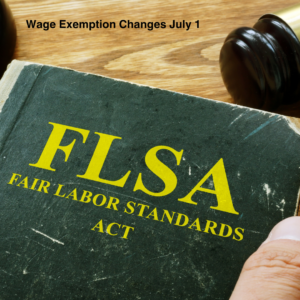
Next month on July 1, a change to the Fair Labor Standards Act law goes into effect to protect workers in cases where the current overtime salary threshold is too low. The law known as the final rule Defining and Delimiting the Exemptions for Executive Administrative, Professional, Outside Sales and Computer Employees includes impacted workers in professional and business services, healthcare and social services, and financial activities.
The final rule issued on April 23, 2024, updates and revises the regulations issued under section 13(a)(1) of the Fair Labor Standards Act. The Act implements the exemption from minimum wage and overtime pay requirements for executive, administrative, and professional (EAP) employees. DOL
It is important businesses are ready for these changes by revising job descriptions, having a process in place to collect and review timecards on a regular basis, and ensuring payroll is ready to accurately calculate any overtime pay.
Rule Outcome
The final rule will increase the standard salary level and the highly compensated employee total annual compensation threshold on July 1, 2024, and again on January 1, 2025, when changes in the methodologies used to calculate these levels become applicable. The updated salary threshold will be phased in over eight months. The Rule also provides for future updates of the levels every three years to reflect current earnings data. DOL
Add to the Calendar
- Effective July 1, 2024, the salary threshold will be to $844 a week. This is the equivalent of $43,888 annually for a full-time, full-year worker.
- Effective January 1, 2025, the salary threshold will be to $1,128 per week. This is the equivalent of $58,656 per year for a full-time, full-year employee.
Who Will Benefit?
- 56% (2.4 million) of these workers are women
- 24% (1 million) of these workers are workers of color
Chart of Earnings Thresholds for EAP Exemption from Minimum Wage and Overtime Protections.
Evaluate to Define an EAP Exemption
- To be paid a pre-determined and fixed salary that is not subject to reduction because of variations in the quality or quantity of work performed.
- Paid at least a specified weekly salary level; and
- To primarily perform executive, administrative, or professional duties, as provided in the Department’s regulations.
**DOL Regulations also provide an alternative test for certain highly compensated employees who are paid a salary, earn above a higher total annual compensation level, and satisfy a minimal duties test.
Outcomes of the Proposed Rule
- Restore and extend overtime protections to low paid salaried workers.
- Give workers who aren’t exempt EAP employees time back.
- Prevent future erosion of overtime protections and ensure greater predictability.
- Restore overtime protections for U.S. territories.
This informative article is brought to you by Staffing Kansas City, a full-service Kansas City employment agency that provides “Personnel Services with a Personal Touch!”


